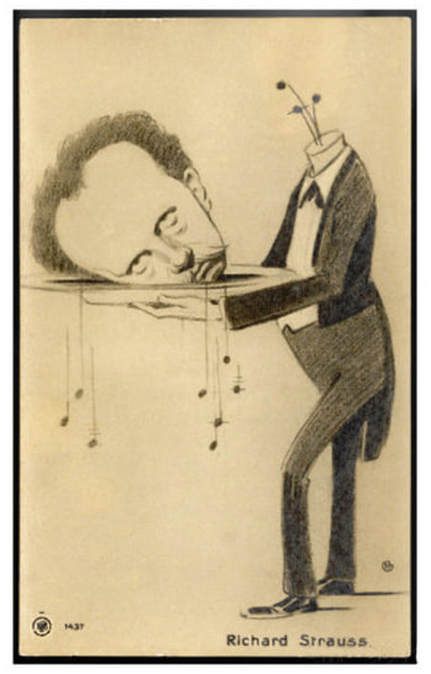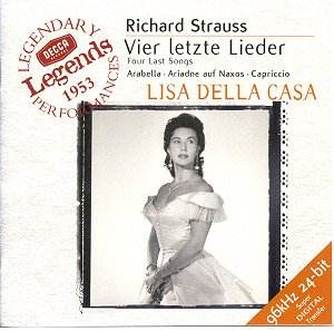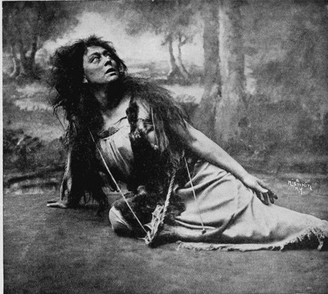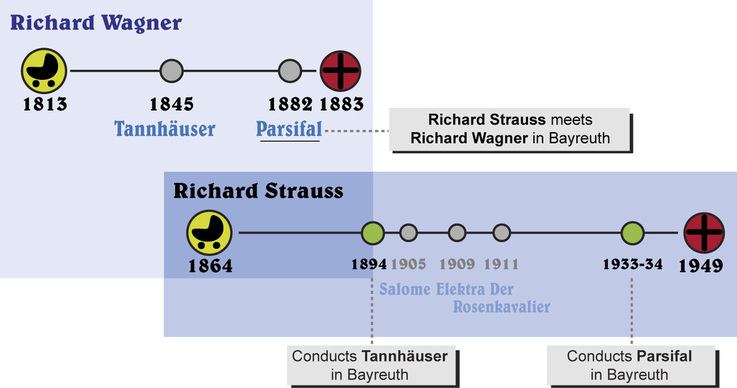The Wagner - Strauss Connection
By Salome I became acquainted with the music of Richard Strauss. Together with its successor Elektra, Salome forms an impressive tandem of shock operas (highly recommended for those who want to go outside rock-music defined paths).
|
|
His father Franz Joseph was a great horn-player. Richard Wagner often came to him for advice regarding the instrument. But, despite that and the fact that Franz Strauss played horn in the orchestra during the Parsifal-premiere in Bayreuth in 1882, the two men didn’t get along very well. Franz Strauss was an adept of the first Vienna school. A man who considered Mozart as the greatest composer who had ever lived. Even greater than Beethoven. He loathed Wagner. He called him the Mephistopheles of music. And it was with some reservation that he brought his son Richard with him to Bayreuth in 1882. On that occasion Richard Strauss met Wagner and it didn’t take too long before the young man fell under the spell of the sorcerer of Bayreuth. His father must have frowned at the conversion of his son to the music of the future. He had given him a musical education in the strictly classical vain, away from modernism. He died in 1905. Months before his son’s breakthrough opera Salome would have its premiere in December that year.
Father Franz Joseph loathed Wagner. He called him the Mephistopheles of music. |
Much to his own deep rooted wish Richard Strauss conducted several times in Bayreuth. But after the first time in 1894 it would last almost 40 years before he came to conduct there again. Mainly because of a quarrel with Siegfried Wagner. A discord on ideas on how to conduct the operas of Maestro Richard. The strong aversion from Cosima against Strauss’ Salome widened the gap and it was not until Siegfried and Cosima both died in 1930 that Strauss was to return to Bayreuth. In 1933 he would take over the baton from Toscanini who turned his back to the festival because of the growing anti-Semitism in Bayreuth (and Germany). The Parsifal of Strauss was about 40 minutes faster than Toscanini’s. "It was already composed to be slow by the Maestro, no reason to conduct it slow", according to Richard S. Thus enabling the audience to catch the last train home.
For his affiliation with Bayreuth in 1933, the year Hitler came to power, and his presidency of the Reichsmusikkammer from 1933 until 1935, Strauss was heavily criticized. It was Toscanini who said: “To Strauss the composer I take off my hat; to Strauss the man I put it back on again.”
Of all people it was Stefan Zweig (the Jewish librettist for Die Schweigsame Frau who commited suicide while in exile in Brazil in 1942), who would cut him some slack.
“to be co-operative with the national socialists was furthermore of vital interest to him, because in the national socialist sense he was very much in the red. His son had married a Jewess and thus he feared that his grandchildren, whom he loved above all else, would be excluded as scum from the schools; his earlier operas tainted through the half-Jew Hugo von Hofmannstahl; his publisher was a Jew. Therefore, to him it seemed more and more imperative to create support and security for himself, and he did it most perseveringly.”
Near the end of his life Strauss composed Four Last Songs (the Lisa Della Casa-Böhm CD is in my suitcase for the so-called desert island). With the intro of the song “Fruhling” particularly as a reminder of his predilection of Parsifal. It was Hans Hotter (Bayreuth’s benchmark Wotan from the fifties) who said that Strauss never was tired of emphasizing the fact that for him only two composers were to be taken seriously: Mozart and Wagner.
For his affiliation with Bayreuth in 1933, the year Hitler came to power, and his presidency of the Reichsmusikkammer from 1933 until 1935, Strauss was heavily criticized. It was Toscanini who said: “To Strauss the composer I take off my hat; to Strauss the man I put it back on again.”
Of all people it was Stefan Zweig (the Jewish librettist for Die Schweigsame Frau who commited suicide while in exile in Brazil in 1942), who would cut him some slack.
“to be co-operative with the national socialists was furthermore of vital interest to him, because in the national socialist sense he was very much in the red. His son had married a Jewess and thus he feared that his grandchildren, whom he loved above all else, would be excluded as scum from the schools; his earlier operas tainted through the half-Jew Hugo von Hofmannstahl; his publisher was a Jew. Therefore, to him it seemed more and more imperative to create support and security for himself, and he did it most perseveringly.”
Near the end of his life Strauss composed Four Last Songs (the Lisa Della Casa-Böhm CD is in my suitcase for the so-called desert island). With the intro of the song “Fruhling” particularly as a reminder of his predilection of Parsifal. It was Hans Hotter (Bayreuth’s benchmark Wotan from the fifties) who said that Strauss never was tired of emphasizing the fact that for him only two composers were to be taken seriously: Mozart and Wagner.




